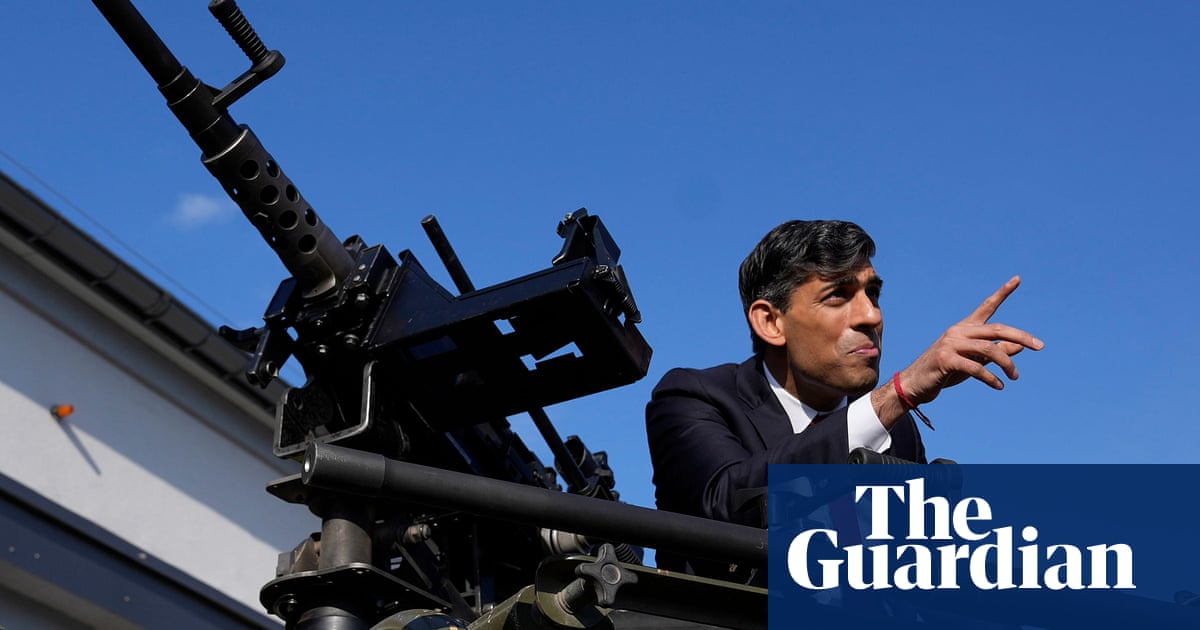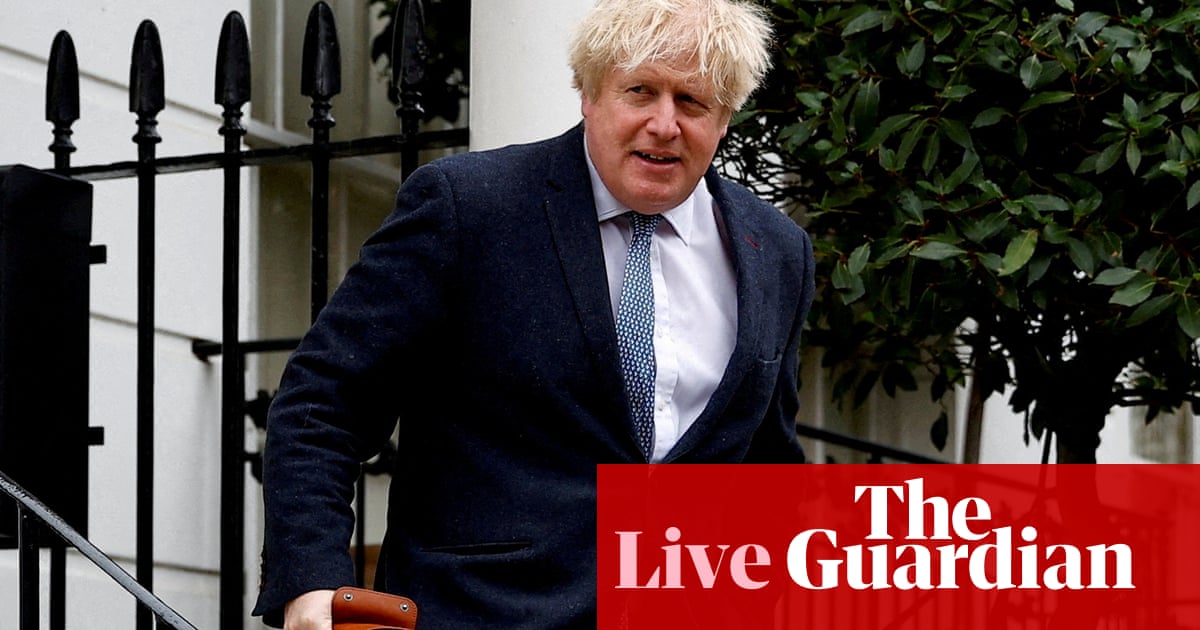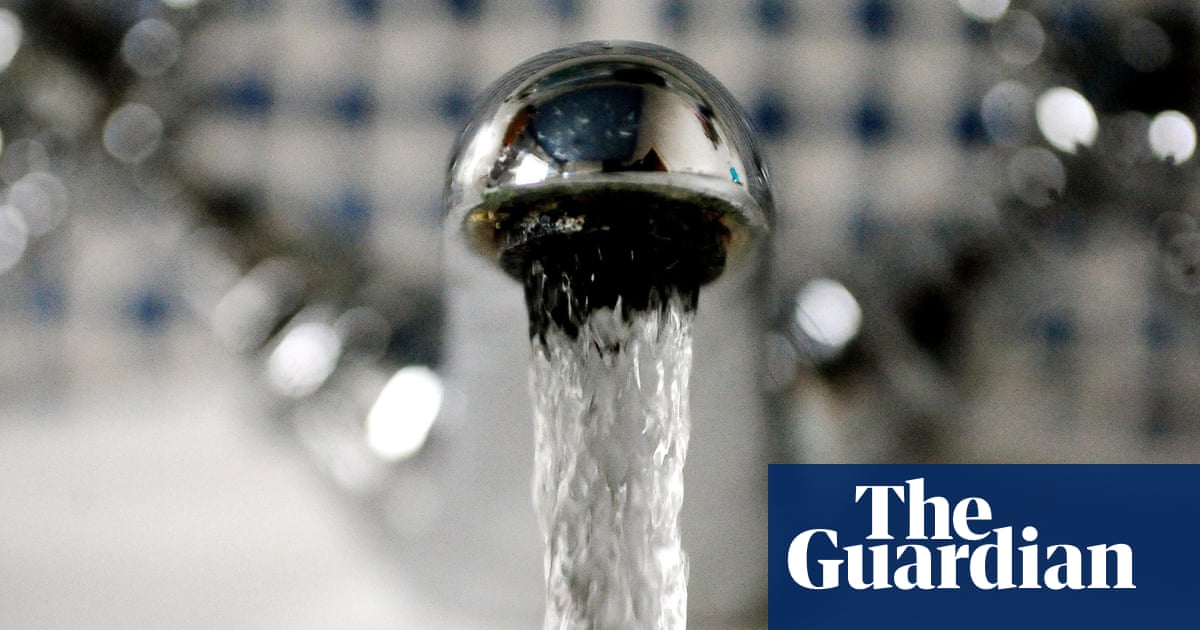
Johnson fails to give MPs firm commitment that defence spending will rise to 2.5% of GDP by end of decade
Mark Harper, the former Tory chief whip, asks Boris Johnson about the strength of his commitment to getting defence spending up to 2.5% of GDP by the end of his decade. He points out that Johnson’s comment on this topic this afternoon (see 3.41pm) was more equivocal than what he said last week.
Harper is right. This is what Johnson said a few minutes ago:
If you follow the trajectory of our programmes to modernise our armed forces, you will draw the logical conclusion that the UK will likely be spending 2.5% of GDP on defence by the end of this decade.
In response, Johnson said he was giving “a straightforward prediction based on what we are currently committed to spending”. But he goes on to say that “much depends” on the size of GDP at the end of the decade.
This seems to back up Harper’s suggestion that the commitment is not an absolute one.
UPDATE: Harper said:
When the prime minister’s remarks at the Nato summit were reported last week, the 2.5% commitment to spend on defence appeared to be really quite solid. His remarks today are less so. So assuming it is a commitment, can I just ask him, is it a commitment? And secondly, how are we going to pay for it?
Johnson replied:
This is a straightforward protraction - prediction - based on what we are currently committed to spending under the Aukus programme and under the FCAS [Future Combat Air System] programme as well.
These are gigantic commitments. I think they’re the right thing for the UK. They will take us up to that threshold. Of course much depends on the size of our GDP at the time. Much depends on the growth in the economy.
I think we’re going to pay for it out of steady and sustained economic growth.
Afternoon summary
Boris Johnson was aware of some allegations relating to Chris Pincher when the MP for Tamworth was appointed deputy chief whip in February, Downing Street has admitted.
Keir Starmer is to set out his vision for Brexit, promising to remove a series of trade and travel barriers while insisting that the debate on any UK return to the single market or customs union is definitively closed. For a full summary of Starmer’s speech, see 11.20am. And for full details of Starmer’s five-point plan for Brexit, see 11.34am. Robert Peston, ITV’s political editor, has been interviewing Starmer about his plan and, in a blog, he says he came away unimpressed by the answers Starmer gave him. Here is an excerpt.
On whether it makes economic sense, I pointed out that many economists would say that the economic price to the UK of being outside the EU stems mainly from the increased costs of trading with the EU that were imposed when the UK left the EU’s single market and customs union.
The heart of Starmer’s plan, however, is that the UK must not rejoin the customs union and single market - largely because it would reopen all those emotional arguments about whether the UK should subjugate its product standards and service standards to those of the EU.
And when I asked Starmer whether a single distinguished economist had backed his plan, he deflected and did not answer ...
In a nutshell, Labour’s new Brexit policy is at its heart similar to Johnson’s. It’s Starmer’s recognition that the hard Brexiters have definitively won the argument.
It is only more credible than Johnson’s approach to Brexit if you believe the EU is more likely to give the UK what it wants and needs in the coming years of negotiations if Johnson’s nuclear option of breaching the Brexit treaty and international law is neither wielded or held in reserve.
A Labour government would scrap the House of Lords and create a “senate of the nations and regions” in its place, Anas Sarwar, the Scottish Labour leader, has announced. For a full summary of Sarwar’s speech, see 1.25pm.
The government should impose strict price controls on fuel and basic food items to help families struggling with soaring living costs, the former Labour shadow chancellor, John McDonnell, has said.
Keir Starmer told Sky News that the appointment of Chris Pincher as deputy chief whip was yet another example of bad judgment by Boris Johnson. He said:
I have got no sympathy with a prime minister who repeatedly makes bad judgment calls.
We have been living with a version of this story for month after month after month. Bad judgment by a man who puts himself above everything. I don’t have any sympathy for him.
The Green party has claimed that millions of Britons are being let down because Labour’s Brexit policy is now “indistinguishable” from the Conservatives. In a statement on Keir Starmer’s Brexit speech, Adrian Ramsay, the Green party’s co-leader, said:
At a time when the economic devastation caused by Brexit is becoming increasingly clear, and as public opinion is turning against the decision to leave the European Union, it is quite perverse of Keir Starmer to stick his head in the sand and insist he will make Brexit work.
This is an idea driven only by Labour’s self-interest rather than the best interests of the country.
While businesses are suffering and the permanent fall in the value of sterling means we are importing inflation, making the cost of living crisis worse, the fact that the two main parties are indistinguishable from one another on Brexit is a major failing of our political system and is letting millions of people down.
The Green party has already called for rejoining the customs union, which would ease the tensions in Northern Ireland caused by Johnson’s hard Brexit, and for maintaining alignment with EU law and we utterly oppose government attempts to undermine environmental and social protections offered by EU legislation.
Starmer insists that, although Labour would not join the single market or the customs union, his approach to Brexit would be very different from Boris Johnson’s. (See 11.20am.)
Summary of Boris Johnson"s statement to MPs about G7, Nato and Commonwealth summits
Boris Johnson’s Commons statement was a relatively low-key affair. The Chris Pincher scandal did not come up at all (MPs are only allowed to asks questions relevant to the subject of the statement), and most of the questions related to Ukraine, on which there is broad cross-party agreement. Here are the main points.
Johnson signalled that what he said last week about defence spending rising to 2.5% of GDP by the end of the decade does not amount to a firm commitment. He said he expected defence spending to increase by that amount, but that growth figures could skew the calculations. (See 4.12pm.)
He claimed that “not a single person” at the summits he attended told him that the UK was in breach of international law because of the Northern Ireland protocol bill. (See 4.24pm.)
He said the international community was looking at “alternative routes” to get grain out of Ukraine if the sea route continues to be blocked by Russia. This could involve using the Danube river, he said. He told MPs:
What we are also looking at is the possibility of using the rivers, using the Danube in particular, to try to get ... using the railways to try to get the grain out in smaller quantities than we would be able to do with a giant maritime convoy through the Black Sea. So we are looking at all the possible options, including smaller packets of grain coming out that way.
He said Saudi Arabia needed to produce more oil. He said:
There may be some question about how much more the Saudis could pump out at this particular moment, but there’s no doubt we’re going to need a lot more Opec Plus oil.
The UK has strong and productive relations with Saudi Arabia, we need to make sure the whole of the west does as well, and we make that point to the Saudis. But that is the way forward, they need to produce more oil, no question.
At the Institute for Government event earlier Jeremy Hunt, the Tory former foreign secretary, refused to say whether he would stand as a candidate in a future leadership contest. (See 1.55pm.) At Westminster it is widely assumed that he will be a candidate, and that he is already planning his campaign.
But, according to a detailed survey of Conservative party members by the ConservativeHome website, Hunt is likely to lose if he does stand.
Yesterday the website published the results of a survey of members on who should be the next party leader. There was no clear winner. Ben Wallace, the defence secretary, was in first place, only very narrowly ahead of Penny Mordaunt, the Cabinet Office minister. Both were on 16%.
Today the website has been publishing the results of surveys looking at how members would vote given a choice of just two candidates. That is because, under Tory leadership election rules, MPs eliminate candidates until just two are left on the shortlist put to members.
The results suggest Hunt would lose against all likely candidates.
Wallace is the candidate who emerges as strongest from this exercise. But, as the ConservativeHome editor Paul Goodman writes in his summary, a surprisingly high number of respondents answered don’t know to the various questions, suggesting a future contest is wide open.
However, the exercise does show that one nation candidates are unlikely to go far - and that there is potential for a candidate with a relatively low profile to cause an upset (eg Kemi Badenoch, the equalities minister, who ties with Rishi Sunak, the chancellor, in this exercise,)
Johnson claims "not a single person" told him at summits that NI protocol bill in breach of international law
In response to a question from the SNP’s Joanna Cherry about the Northern Ireland protocol, Johnson said that “not a single person” at the summits told him that the UK was in breach of international law.
Labour’s Liam Byrne says this is hard to believe.
UPDATE: Cherry said:
I note [Johnson] indicated to the leader of the opposition that some of his interlocutors last week at least had raised these issues with him.
And all of us who have travelled abroad on parliamentary business recently will have had these issues raised with us.
So can he tell us exactly what concerns were raised with him over the last week about his government’s disrespect for the international rule of law and human rights, and what he’s going to do about it?
In reply, Johnson said:
I can tell the honourable lady ... not a single person said that the UK was in breach of international law. On the contrary, what they did say was that we were helping the world to stand up against breaches of international law.
Johnson fails to give MPs firm commitment that defence spending will rise to 2.5% of GDP by end of decade
Mark Harper, the former Tory chief whip, asks Boris Johnson about the strength of his commitment to getting defence spending up to 2.5% of GDP by the end of his decade. He points out that Johnson’s comment on this topic this afternoon (see 3.41pm) was more equivocal than what he said last week.
Harper is right. This is what Johnson said a few minutes ago:
If you follow the trajectory of our programmes to modernise our armed forces, you will draw the logical conclusion that the UK will likely be spending 2.5% of GDP on defence by the end of this decade.
In response, Johnson said he was giving “a straightforward prediction based on what we are currently committed to spending”. But he goes on to say that “much depends” on the size of GDP at the end of the decade.
This seems to back up Harper’s suggestion that the commitment is not an absolute one.
UPDATE: Harper said:
When the prime minister’s remarks at the Nato summit were reported last week, the 2.5% commitment to spend on defence appeared to be really quite solid. His remarks today are less so. So assuming it is a commitment, can I just ask him, is it a commitment? And secondly, how are we going to pay for it?
Johnson replied:
This is a straightforward protraction - prediction - based on what we are currently committed to spending under the Aukus programme and under the FCAS [Future Combat Air System] programme as well.
These are gigantic commitments. I think they’re the right thing for the UK. They will take us up to that threshold. Of course much depends on the size of our GDP at the time. Much depends on the growth in the economy.
I think we’re going to pay for it out of steady and sustained economic growth.
Ian Blackford, the SNP leader at Westminster, accuses Johnson of failing to develop a coherent plan to bring down energy prices.
He asks what the PM will do to allow grain exports from Ukraine.
And he asks why the PM thinks it will help for the UK to break international law over the Northern Ireland protocol.
Johnson says Blackford should look carefully at the G7 communique. There were proposals covering items like a cap on energy prices, he says. And he says more grain is being exported from Ukraine.
On the NI protocol, he says this was not generally an issue raised with him at the summits.
Tobias Ellwood (Con), chair of the Commons defence committee, urges the PM to get a UN security council resolution to create a UN safe haven around Odesa, so that grain exports can resume.
Johnson says it may be necessary to seek a solution that does not depend on Russian consent.
Starmer welcomes the expansion of Nato.
He asks if the UK can continue to meet its obligations to Nato in the light of the defence cuts.
Turning to the Commonwealth, he says he was worried by the lack of unity on display at the summit.
There have been serious signs of strain, he says. Many Commonwealth countries abstained from a vote on a United Nations resolution over the invasion of Ukraine. The summit should have been an opportunity to create unity, he says. But he says instead the PM engineered a row over the post of secretary general. And Johnson’s failure to get the outcome he wanted showed his “embarrassing lack of influence”.
Keir Starmer is responding to Johnson. He starts with a joke, welcoming the PM back to the UK and adding:
They say that absence makes the heart grow fonder. So I wish you the best of luck in seeing if that works as a party management strategy.
Johnson says not every member of the Commonwealth takes the same view of the invasion of Ukraine as the UK does.
He goes on:
It was vital to have the opportunity to counter the myth and to point out that food prices are rising because Putin has blockaded one of the world’s biggest food producers. And if large countries are free to destroy their neighbours, then no Commonwealth member, [whatever their] distance from Ukraine, would be genuinely secure.
Johnson starts by talking about Ukraine.
He says the decision of Sweden and Finland to join Nato after the invasion of Ukraine has shown the folly of Vladimir Putin’s strategy. Having Finland in the alliance doubles the length of the Nato border with Russia, he says.
He says the value of military, economic and humanitarian aid to Ukraine from Nato has been almost £4bn.
And he says if you follow the trajectory of UK military spending, it is set to rise to 2.5% of GDP by the end of this decade.
UPDATE: Johnson said:
If you follow the trajectory of our programmes to modernise our armed forces, you will draw the logical conclusion that the UK will likely be spending 2.5% of GDP on defence by the end of this decade.












